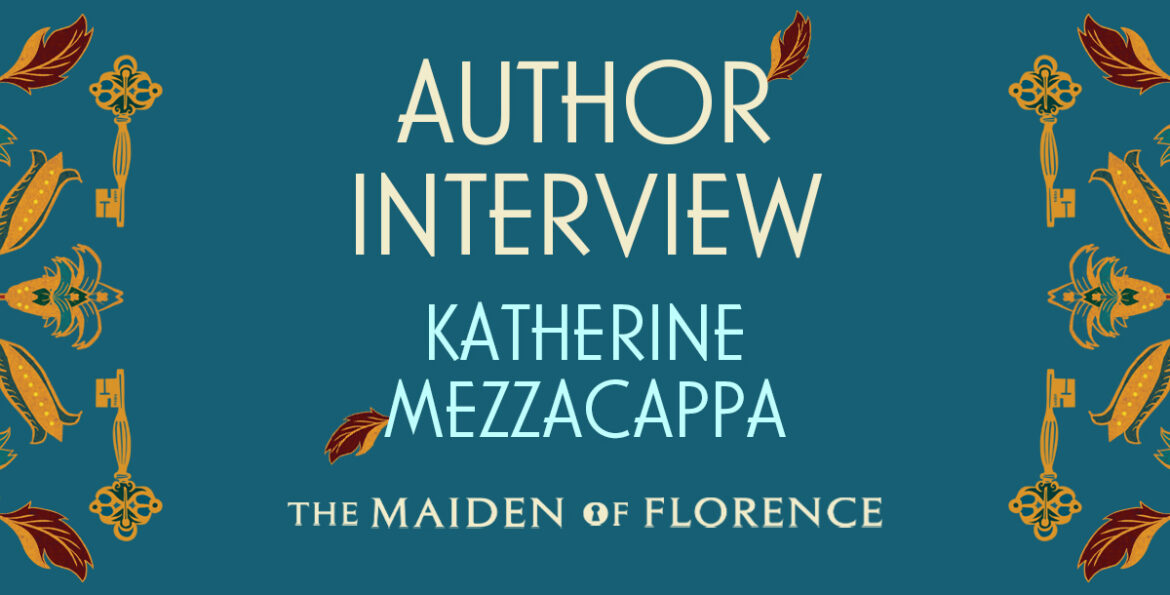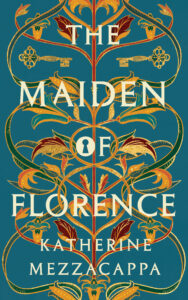

Interview with Katherine Mezzacappa and an exclusive extract
- 18th April 2024
- Category : Author,Blog,Interviews & Blogs
Katherine Mezzacappa is an Irish author currently living in Carrara, northern Tuscany. Her novel The Maiden of Florence is a reimagining of the life of a true woman and is publishing with Fairlight Books.
How did you start writing and what does it mean to you?
Writing was something I had always meant to do but other things got in the way. Then a friend alerted me to a new Masters programme at Canterbury Christ Church University – this was in 2003. The course was transformational, but I didn’t act on it immediately as again ‘other things got in the way’ but when I did finally in 2016, some years after moving to Italy, I couldn’t stop: seven novels published (under three different names) including The Maiden of Florence and two more in-press, and twenty published short stories.
What does it mean to me? I am simply at my happiest when I am writing, and difficult to be around if writing is not flowing. That doesn’t mean I have to be writing all the time but that somewhere within every twenty-four hours a significant quantity of writing has been done.
What’s your favourite book and who is your favourite author?
That’s the toughest question. Overall, my favourite author of all time is probably Thomas Hardy but my favourite novel is perhaps LP Hartley’s The Go-Between. It has the best opening line I know.
What’s a piece of advice you can give to aspiring authors?
Read widely but well. Put simply, if you read garbage then you are more likely to produce it. Remember that writing is a habit, not a hobby. Do it daily; don’t wait for ‘the right moment’ as that is now. Don’t worry about how good what you write is each day, as you can go back and revise tomorrow. You’ll never be able to revise a blank page.
Do you have any habits or rituals to get you in the mood for writing?
There isn’t an ideal time of day or anything. But I am a ferocious list-maker. So ‘I,000 words’ will appear somewhere on a daily list along with things like ‘Duolingo Irish, ironing, exercise’ etc.
What inspired you to write The Maiden of Florence?
My teenaged son was having difficulties engaging with school and so had a series of appointments with an educational psychiatrist. We were late for one of these meetings and so I’d rushed out without a book or a Kindle and was faced with an hour in a waiting room with nothing to do but fiddle with my phone. There were some gossip magazines (this was pre-Covid) but also one clinical journal devoted to erectile dysfunction. It had a small historical article about the proof of virility imposed on Vincenzo Gonzaga in 1584, following the annulment of his first marriage for non-consummation. Giulia was the girl procured for that test. There was no escape from writing that story.
The Maiden of Florence gives a voice to a woman previously forgotten in history – what was the process of researching this story?
Firstly I read everything I could find about the story. It had surfaced intermittently through the centuries but when it did, it was usually treated as a Boccaccio-like fable, that is, in the style of The Decameron, primarily to amuse. Roger Peyreffite’s The Prince’s Person (1963: La Nature du Prince) is chief of these, but is full of howling inaccuracies. Peyrefitte made up the bits where the historical evidence was missing. I’ve done that too, but I’ve written a novel. There was also the 1965 film A Maiden for a Prince (Una Vergine per il Principe) played entirely for laughs, replete with battering ram imagery. I read a great deal about the position of women in 16c Italy, about the consignment of girls to nunneries where the family did not have sufficient funds for dowries for all their daughters, about Renaissance orphanages and their benefactors, about crime and punishment in Medici Florence and about Vincenzo Gonzaga’s extensive patronage of art and music; I listened to music he had commissioned.
While the story is Giulia’s, we also see her husband Giuliano’s point of view. What was the reasoning behind this?
When I set out to tell Giulia’s story, and to create what wasn’t known about her after the test that provided her with her place in history, I had a vague idea about giving her a happy ending. It isn’t that I think a happy ending is dependent on a man, marriage and happy ever after, but in Renaissance terms that was in some respects perhaps the best a woman could hope for. A woman in Renaissance Italy also had limited agency. Giuliano as a man could move in a world outside the family home, and write about it, in a way his wife could not. In the story I have given him, he is a pawn of his ‘superiors’ just as she is – though in different ways.
You live in Italy yourself – did this have any influence on writing Giulia’s story?
It did and it didn’t. I sometimes find it easier to write historical fiction about a place when I am not in it, because I can better keep the here-and-now at arm’s length from the historical setting I am trying to evoke. Part of this book was written on a residency in County Kerry; I could see what I was writing about more clearly in that rural setting than sometimes I could in modern Italy. But of course it was helpful being able to visit the Innocenti museum in Florence, the Palazzo Davanzati which became the model for Vinta’s house, and all the places where Vincenzo lived in Mantua.
The Maiden of Florence is brutally honest about the trauma Giulia endures. How did you approach writing the more sensitive and difficult aspects of her story?
That was hard, as there is no control over how a reader will absorb what you have written. The first part of the book deals with the lead up to the test, the test itself and the aftermath. Here I stuck very closely to the evidence of the official correspondence of the Medici minister Belisario Vinta, writing to his employer the Grand Duke of Tuscany, whilst telling the story through Giulia’s eyes. What happened to Giulia was both brutal and relentless. Holding back on the detail, I felt, would be a denial or diminution of that. Some readers might weep or be enraged at the account.
You’ve written a number of novels; what would you say was the biggest challenge in writing The Maiden of Florence?
Getting the ‘voice’ right. In writing a novel set in 1930s England, I can get closer to that voice by reading what people were reading at that time (that could include Agatha Christie, though I have yet to write a crime novel) and letting that seep into my prose. For The Maiden of Florence, I read contemporary correspondence and diaries (though bear in mind that most of this was written by men) but then needed to transform that into a voice in English that somehow captured some of the character of Renaissance writing, without being too ‘have at thee varlet’ about it. The single most useful source was Mary Rogers and Paola Tinagli’s Women in Italy 1350-1650: Ideals and Realities.
If you could say one thing to Giulia, what would it be?
I think I would tell her that I love her and that I admire her courage.
What is one thing you’d like readers to take away from The Maiden of Florence?
I would hope they would feel that I have achieved some small measure of justice for Giulia, by giving her a voice.
*
Scan or click the QR code to read an excerpt of The Maiden of Florence.
*
The Maiden of Florence is publishing on the 18 April 2024. Order now from Blackwell’s, Bookshop.org or Waterstones.
















